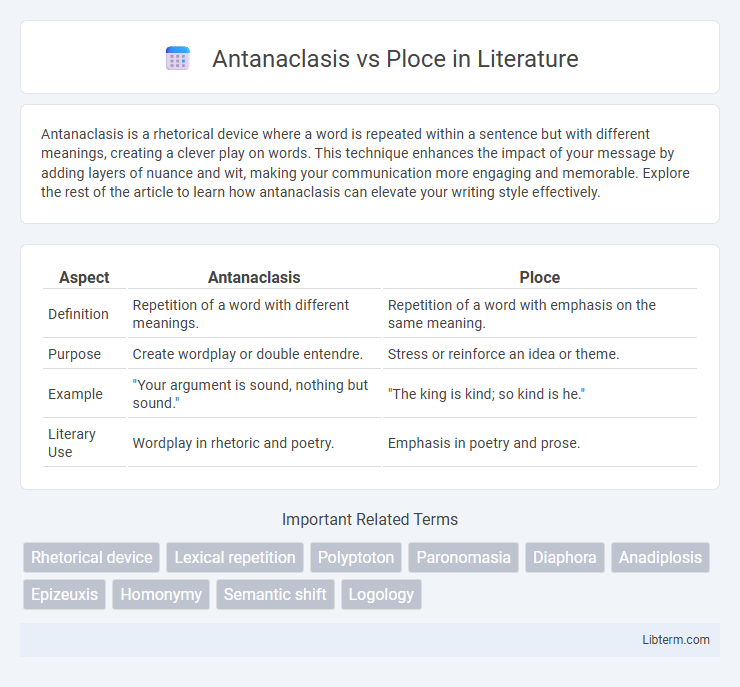Antanaclasis is a rhetorical device where a word is repeated within a sentence but with different meanings, creating a clever play on words. This technique enhances the impact of your message by adding layers of nuance and wit, making your communication more engaging and memorable. Explore the rest of the article to learn how antanaclasis can elevate your writing style effectively.
Table of Comparison
| Aspect | Antanaclasis | Ploce |
|---|---|---|
| Definition | Repetition of a word with different meanings. | Repetition of a word with emphasis on the same meaning. |
| Purpose | Create wordplay or double entendre. | Stress or reinforce an idea or theme. |
| Example | "Your argument is sound, nothing but sound." | "The king is kind; so kind is he." |
| Literary Use | Wordplay in rhetoric and poetry. | Emphasis in poetry and prose. |
Introduction to Antanaclasis and Ploce
Antanaclasis involves the repetition of a word in a sentence or phrase but with different meanings each time, enhancing rhetorical effect through wordplay. Ploce is the deliberate repetition of a word or phrase to emphasize a concept or idea, often reinforcing the emotional or thematic content of a text. Both devices serve distinct purposes in literature and rhetoric by manipulating word repetition for nuanced expression.
Defining Antanaclasis
Antanaclasis involves the repetition of a word within a sentence or phrase but with different meanings each time, creating a play on words that adds depth and wit. This rhetorical device contrasts with ploce, which is the deliberate repetition of a word or phrase for emphasis without changing its meaning. Understanding antanaclasis enhances the appreciation of linguistic nuance and stylistic creativity in literature and speech.
Defining Ploce
Ploce is a rhetorical device involving the deliberate repetition of a word or phrase within a sentence or passage to emphasize a particular idea or theme. Unlike antanaclasis, which relies on the repeated word having different meanings, ploce focuses on reinforcing a concept through reiteration in the same or slightly varied sense. This technique enhances clarity and persuasiveness by drawing attention to key terms.
Key Differences Between Antanaclasis and Ploce
Antanaclasis involves repeating a single word but using it with different meanings within the same sentence or phrase, creating a play on words that highlights the word's polysemy. Ploce, in contrast, is the deliberate repetition of a word or phrase in close proximity for emphasis or rhetorical effect without changing its meaning. The key difference lies in semantics: antanaclasis exploits multiple meanings of a term for wordplay, whereas ploce reinforces a concept by repeating the same meaning.
Historical Examples of Antanaclasis
Antanaclasis, a rhetorical device involving the repetition of a word in a different sense, appears prominently in Shakespeare's works, such as in "The Merchant of Venice" where "bond" refers both to a legal bond and personal obligation. Another historical example is Benjamin Franklin's famous phrase, "We must all hang together, or assuredly we shall all hang separately," playing on the dual meanings of "hang." These instances highlight antanaclasis's effectiveness in enhancing literary and persuasive impact through semantic contrast.
Notable Instances of Ploce in Literature
Ploce, a rhetorical device involving the repetition of a word or phrase with a change in meaning, appears notably in Shakespeare's works, such as in "Macbeth" with the phrase "fair is foul, and foul is fair," where repetition deepens thematic complexity. Another significant instance is in John Milton's "Paradise Lost," where the deliberate reuse of terms emphasizes theological and philosophical contrasts. These examples illustrate ploce's power to enrich literary meaning by layering interpretations through repetitive language.
Rhetorical Purpose of Antanaclasis
Antanaclasis employs the repetition of a word with different meanings to create a rhetorical effect that highlights contrast, irony, or humor, enhancing persuasive and emphatic communication. This figure of speech often deepens the audience's engagement by prompting reflection on the word's dual significance within a single context. Unlike ploce, which stresses repetition for emphasis and rhythm, antanaclasis leverages semantic shift to provoke thought and underscore nuanced meanings.
Stylistic Effects of Ploce
Ploce creates emphasis by repeating a word with a deliberate shift in meaning, enriching the text with layered significance and enhancing persuasiveness. Unlike antanaclasis, which exploits a word's homonymic ambiguity for humor or irony, ploce reinforces key concepts and deepens reader engagement through precise lexical reiteration. This technique strengthens thematic cohesion and amplifies rhetorical impact by making ideas resonate more vividly.
Tips for Recognizing Antanaclasis and Ploce
Antanaclasis is identified by the repetition of the same word with different meanings within a sentence or phrase, such as "Time flies like an arrow; fruit flies like a banana." Ploce involves repeating a word or phrase for emphasis or rhetorical effect, often altering its syntactical role without changing its meaning, like "I am that I am." To distinguish between the two, observe if the repeated term shifts in meaning (antanaclasis) or remains consistent but gains emphasis through repetition (ploce).
Conclusion: Impact on Language and Literature
Antanaclasis and ploce enrich language by exploiting the repetition of words with different meanings or forms to create emphasis and depth in literary texts. Antanaclasis enhances rhetorical effect through witty wordplay, while ploce reinforces key themes by repeating words for clarity and intensity. Their strategic use profoundly shapes literary style, influencing readers' interpretation and engagement with texts.
Antanaclasis Infographic

 libterm.com
libterm.com